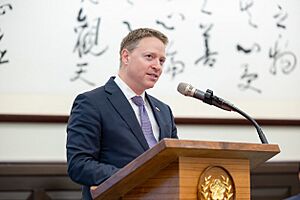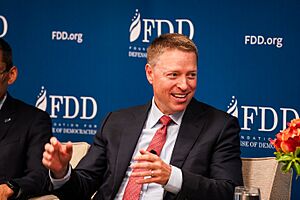Matt Pottinger facts for kids
Quick facts for kids
Matt Pottinger
|
|||||||
|---|---|---|---|---|---|---|---|

Matt Pottinger in June 2024
|
|||||||
| 32nd United States Principal Deputy National Security Advisor | |||||||
| In office September 22, 2019 – January 7, 2021 |
|||||||
| President | Donald Trump | ||||||
| Preceded by | Charles Kupperman | ||||||
| Succeeded by | Jonathan Finer | ||||||
| Personal details | |||||||
| Born |
Matthew Forbes Pottinger
1973 (age 52–53) |
||||||
| Spouse |
Yen Duong
(m. 2014) |
||||||
| Children | 2 | ||||||
| Parent |
|
||||||
| Education | University of Massachusetts, Amherst (BA) | ||||||
| Military service | |||||||
| Allegiance | |||||||
| Branch/service | |||||||
| Years of service | 2005–2010 (active) 2010–present (reserve) |
||||||
| Rank | Lieutenant Colonel | ||||||
| Battles/wars | Iraq War War in Afghanistan |
||||||
| Awards | Bronze Star Combat Action Ribbon Defense Meritorious Service Medal |
||||||
| Chinese name | |||||||
| Chinese | 博明 | ||||||
|
|||||||
Matthew Forbes Pottinger (born 1973) is an American who used to be a journalist and a U.S. Marine Corps officer. He served as the United States Deputy National Security Advisor from September 2019 to January 2021. This role meant he was a top advisor to the President on important national security issues.
Before this, he was the Asia director on the National Security Council starting in 2017. He worked on policies for the Trump administration regarding China.
Pottinger resigned on January 6, 2021, after the events at the U.S. Capitol. He left the White House the next morning.
Today, Pottinger is the Chairman of the China Program at the Foundation for Defense of Democracies (FDD). He is also the CEO of Garnaut Global, a company that advises on world politics. He is a special visiting expert at the Hoover Institution.
Contents
Early Life and Education
Matt Pottinger is the son of J. Stanley Pottinger, who was an author and worked for the Department of Justice. Matt went to Milton Academy for school. He graduated from the University of Massachusetts Amherst with a degree in Chinese studies. He can speak Mandarin fluently.
Career Path
Journalism Work
Before joining the military, Pottinger worked as a journalist. He reported for Reuters from 1998 to 2001. Then, he worked for The Wall Street Journal until 2005.
He covered many important events, like the SARS epidemic and the 2004 Indian Ocean earthquake and tsunami. While reporting on the tsunami, he met United States Marines. Their bravery inspired him. He spent seven years reporting from China.
Military Service
Pottinger decided to join the Marine Corps because of his experiences in China and the Iraq War. He felt that democracy was important and worth fighting for.
In September 2005, Pottinger joined the Marine Corps. He became a military intelligence officer. He served three times in war zones. One deployment was in Iraq from April to November 2007. He also served twice in Afghanistan, from November 2008 to May 2009, and again from July 2009 to May 2010.
In Afghanistan, he helped start the first Marine Corps Female Engagement Teams. These teams worked with women in local communities. He also co-wrote a report called Fixing Intel: A Blueprint for Making Intelligence Relevant in Afghanistan. For his service, he received several awards, including the Bronze Star Medal and the Combat Action Ribbon.
After leaving active service, Pottinger worked in New York City. He was also a fellow at the Council on Foreign Relations (CFR) from 2010 to 2011.
Political Roles
In 2017, Matt Pottinger joined the U.S. National Security Council during the administration of Donald Trump. He was made the Asia director for the NSC. He kept this role under different National Security Advisors.
In his role at the NSC, Pottinger believed in a strong approach towards China. This included both trade and national security issues. In September 2019, he became the Deputy National Security Advisor.
Because he knew a lot about China, he was one of the first people in the Trump administration to suggest more precautions for COVID-19. He also called for a travel ban with China. In May 2020, he gave a speech in Mandarin about the COVID-19 pandemic.
In January 2021, China placed sanctions on Pottinger and other Trump administration officials. This meant China would not allow them to travel to China or do business there. President Biden's National Security Council said these sanctions were "unproductive."
Pottinger resigned on January 6, 2021. This was after supporters of President Donald Trump entered the U.S. Capitol building.
In 2021, Pottinger joined the Hoover Institution as a special fellow. He is part of their research team on "China's Global Sharp Power Project." He also leads the China Program at the Foundation for Defense of Democracies.
In February 2023, Pottinger spoke to the United States House Select Committee on Strategic Competition between the United States and the Chinese Communist Party. He said that ByteDance had used TikTok to watch American journalists. This was to find and act against people who might share information with them. He is also a senior advisor at the Marathon Initiative, a research organization.
In March 2025, Pottinger was chosen to be on the board of trustees for RAND.
Personal Life
In 2014, Matt Pottinger married Dr. Yen Duong. She is a virologist, which means she studies viruses. She came to the United States as a child with her family after they left Vietnam. They have two children and live in Utah.
 | William M. Jackson |
 | Juan E. Gilbert |
 | Neil deGrasse Tyson |


